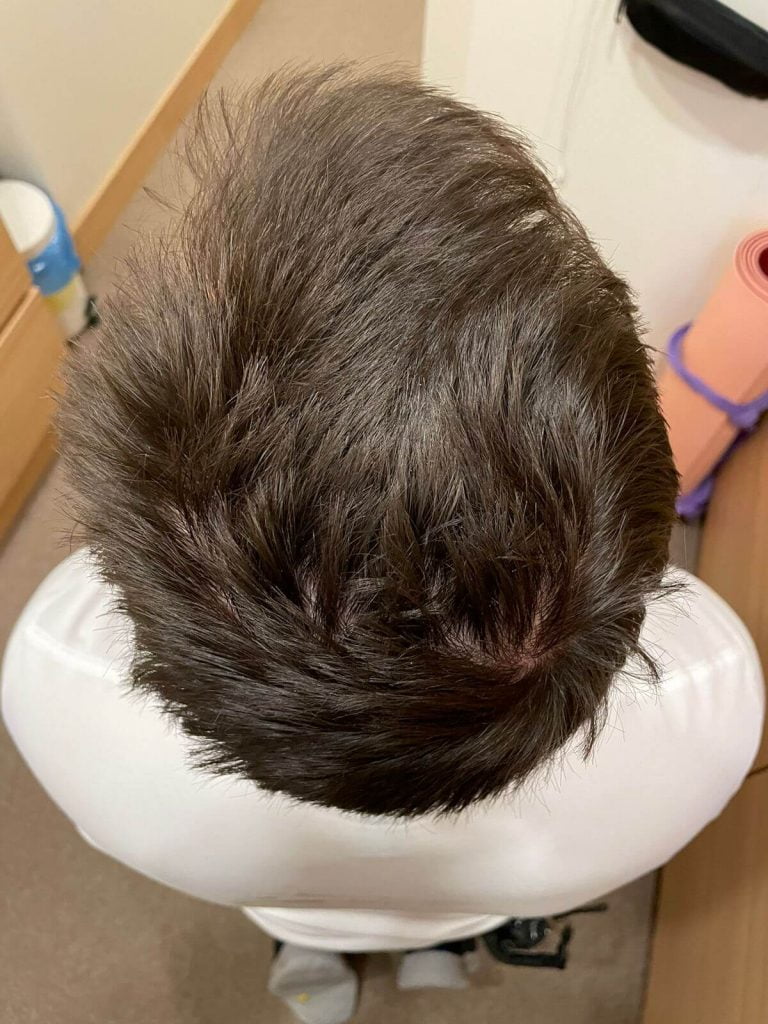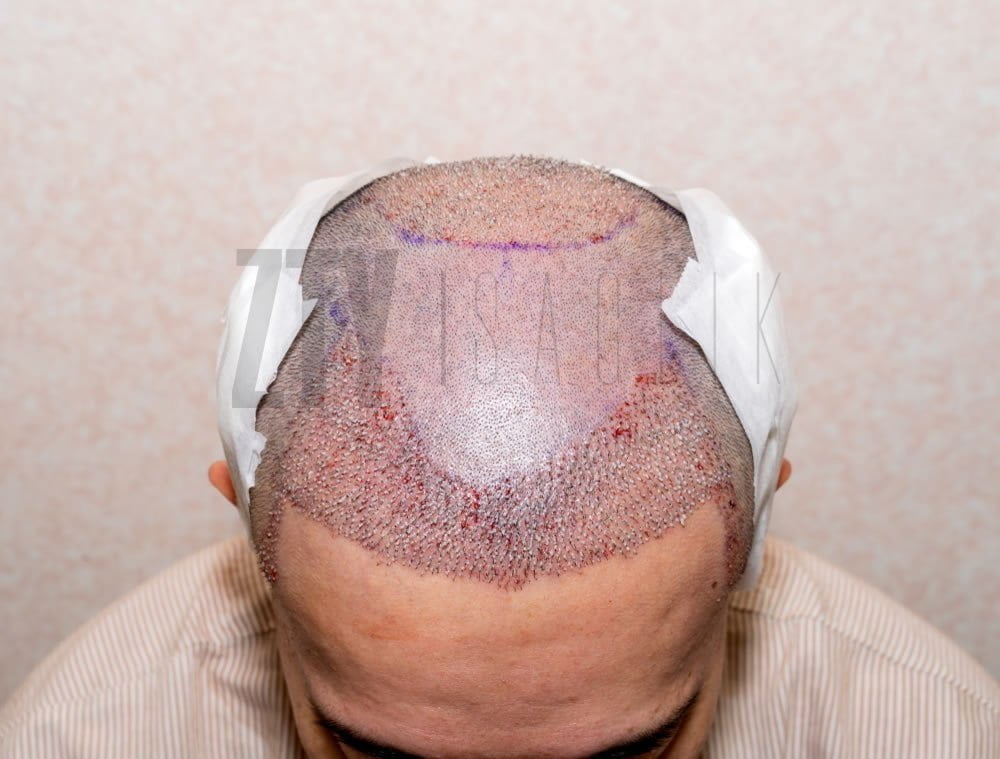Hair Transplant Turkey
Hair transplant in Turkey, although hair transplant is mostly popular among men, it is also known that women resort to hair transplant as a permanent solution for hair loss. The hair implanted in the recipient area provides excellent results for individuals who suffer from hair loss. The smooth and successful hair transplantation creates favorable results that leave patients very satisfied.
How much a hair transplant costs
The cost of hair transplantat in Turkey is 1800 euros. The package includes airport greeting, transfer, hotel, and a hair band after the surgery. Additionally, shampoo and lotion are provided by us. The prices are valid for the year 2023. You can get more information about the fees from our WhatsApp line.
Hair transplant Turkey reviews
Procedure – Aftercare
| Techniques | FUT, FUE, DHI |
| Anesthesia | Local |
| Pain | none to slight |
| Duration | 6 to 8 hours |
| Hospitalization | No hospitalization |
| Shaving | Required to 1mm length |
| Is it permanent | for life |
| Length of stay in Turkey | 4 days |
| Possible side effects temporary | swelling, redness, scabbing |
| Payment options | Cash |
| Recovery | 7-10 days (depending on method) |
| Scarring | Virtually undetectable |
| Sport | from 3-4 weeks post-op |
| Final results | 6-12 months |
What is a hair transplant?
A hair transplant is a surgical procedure that helps to cover areas with thin or no hair. In this process, a doctor moves hair follicles from a region with ample hair, usually the sides or back of the head, to the balding or thinning areas. It’s a popular choice for people experiencing hair loss, and it can offer a permanent, natural-looking solution. Before opting for this, it’s good to have a detailed chat with a specialist to know if it’s the right option for you.
Who is it suitable for?
Anyone with hair thinning or loss can think about getting a hair transplant. It works best if you have enough healthy hair on the back or sides of your head to move to the bald spots. Before you decide, talk to a doctor. They will check the reason for your hair loss and the amount of hair you can donate. Your overall health is also a big factor.
People who are older might be better suited for this because their hair loss pattern is stable. If you’re thinking about this option, it’s best to chat with an expert to figure out if it’s right for you.
Benefits
Hair transplantation can be a big plus for many people. It can make you feel better about yourself, giving you more confidence with a fuller set of hair. One big perk is that it’s a lasting solution, giving a more natural look compared to wigs or hairpieces. The new hair is easy to take care of and blends well with your existing hair. Also, the latest methods mean less scarring and a quicker healing time. If you’re thinking about this, talk to a specialist to learn about all the good points it can offer.
Prepare
Getting ready for a hair transplant is pretty straightforward. First, have a chat with your doctor to know what to expect. You might need to stop some medicines or supplements that can cause more bleeding during the operation.
On the day before the surgery, it’s best to avoid drinks and smoking, as they can slow down your healing. Remember to wash your hair well to lower the risk of infection.
You’ll need someone to drive you home after the surgery because you might feel a bit out of sorts from the anesthesia. Also, set up a comfy and clean spot at home to relax and get better after the surgery.
Always follow your doctor’s advice to have a smooth and successful procedure. If you have any questions, don’t hesitate to ask your doctor before the big day.
The Procedure
- Anesthesia: We use local anesthesia to numb the areas we are working on. This keeps pain and discomfort to a minimum during the procedure.
- Taking Out Hair Follicles: We collect hair follicles from the donor area using one of the methods below:
- FUT (Follicular Unit Transplantation): We remove a strip of skin with hair follicles. Then, we separate individual follicular units from the strip under a microscope.
- FUE (Follicular Unit Extraction): We directly take out individual follicular units from the scalp using small punches.
- Preparing the Recipient Area: We make small cuts in the recipient area where we will transplant the hair follicles.
- Transplantation: We place the collected follicles into the cuts we made in the recipient area.
Closure and Cleaning
- Closing Up: If we used the FUT method, we stitch up the donor area. This helps the wound heal neatly.
- Cleaning: Next, we clean the areas where we worked. Sometimes, we use dressings to protect the wounds and help them heal.
Results
Hair Growth: Over the following months, the transplanted hair follicles will start to grow hair. It may take up to a year to see the full results.
Further Treatments: In some cases, patients may require further treatments to achieve desired results.
Long-Term Care
Long-Term Care: Patients may be advised on long-term care to maintain the results of the transplant, including recommendations on hair care products and potential treatments for hair loss.
What could go wrong
- Infections: Like with any surgery, you might get an infection. Following the care instructions can lower this risk.
- Scarring: You might have noticeable scars from where hair is taken, especially with the FUT method.
- Not Happy with Results: You might not be happy with how your hair looks after. It might grow unevenly or look unnatural.
- Bleeding: There can be a lot of bleeding during or after the surgery.
- Swelling and Bruises: You might see swelling and bruises where you had surgery. This usually goes away in a week.
- Nerve Damage: Sometimes, you might feel numb or tingling where you had surgery, but this is rare.
- Folliculitis: This is when hair follicles get infected or inflamed. Medicine or compresses can help.
- Shock Loss: This is when the new hair falls out temporarily but grows back in a few months.
- Graft Failure: Sometimes, the new hair doesn’t grow as it should, which means the surgery didn’t work as planned.
- Bad Reaction to Anesthesia: You might have a bad reaction to the drugs used to numb the area during surgery.
- Higher Costs: If you need more treatments, the total cost can go up a lot.
- Feeling Stressed: The process can stress you out, especially if things don’t go as planned or if there are complications.
What to do if you have problems
- Call Your Doctor: If something seems wrong, call your doctor right away. They can tell you what to do next.
- Listen to Your Doctor: Do what your doctor suggests. They might give you medicine or tips to help you.
- Clean the Area: Keep the place where you had surgery clean to stop infections.
- Get Emergency Help: If you feel very sick or bleed a lot, go to the emergency room fast.
- Note Down Your Symptoms: Write down what you feel and take photos. This helps your doctor know more about the problem.
- Stay Calm: Try not to worry too much. Being calm helps you deal with the situation better.
- Ask Another Doctor: If you feel you need to, ask another doctor for their opinion.
- Legal Help: If something went very wrong during surgery, you might want to talk to a lawyer to know your options.
Hair Transplant revision
A hair transplant revision is done to fix problems or improve the outcomes from a first surgery. In this process, you first have a chat with your doctor to discuss what went wrong the first time and how to make it better. Your doctor might suggest trying a different method this time to see better results. Sometimes, the doctor might need to remove old grafts that didn’t work well before. Then, they add new hair to fill in gaps or create a more natural look. Just like the first time, there will be a period to heal and recover. Your doctor will give you tips on how to take care of your new hair to help it grow nicely. Later, you’ll have appointments to check how the new grafts are doing. This approach aims to get results that make you happier with your hair.
Why have a Hair Transplant Procedure?
A hair transplant procedure can be a good choice for many reasons. Here’s a more straightforward explanation:
- Better Self-Confidence: Losing hair can be hard on your self-esteem. Getting a hair transplant can make you feel better about how you look.
- Looks Natural: Nowadays, hair transplants give results that look natural and blend in with your existing hair.
- Lasts a Long Time: This procedure is a long-term solution to hair loss. It uses your own hair to fill in the bald spots.
- Improves Appearance: A hair transplant can make you look better, which can help in your personal and work life.
- It’s Safe: When done by an expert, this surgery is safe and usually successful.
- Fights Genetic Hair Loss: If hair loss runs in your family, this surgery can help you get your hair back.
- Saves Money Over Time: Even though it’s costly at first, it can save you money in the long run compared to ongoing treatments.
Hair Transplant in Turkey vs Usa
Hair transplant prices in America are around $10,000. Hair transplant in Turkey is both high quality and inexpensive. Average around $1.800. It is much superior in terms of hair transplantation quality and service quality. We recommend that you also research Turkey while making your choice.
You may be interested in: Dhi Hair Transplant Cost Turkey 2023
What determines the number of graft needed?
It may differ in each patient. But roughly the following criteria can determine the number of hair follicles transplanted.
- The degree of thinning the patient has
- The areas of baldness the patient would like addressed
- The quality of hair in the donor area
- The hair transplant technique used (FUT or FUE)
- Budget
- Predicted future hair loss
Frequently Asked Questions
What Are the Requirements Before Hair transplant in Turkey?
It is highly recommended that patients ensure minimal risk of bleeding prior to the surgery. In this regard, it is important to refrain from activities which may lead to blood thinning such as sexual intercourse and active sports practices for at least 1 week prior to the surgery. In addition, it is recommended that the patient completes all of the tests required by the doctor who will perform the surgery.
How many hairs in a hair graft?
Hair does not grow in only single hair groupings, instead most people’s hair will grow in groups of 1, 2, 3 or 4 hairs. These groups of hairs are referred to as a graft. On average, each person has 2 hairs in each hair graft.
Is it safe to go to Turkey for a hair transplant?
Turkey is popular for hair transplants. Here are some safety tips:
- Pick a good clinic with nice reviews.
- Costs are low, but quality is key.
- Check for clean and safe clinics.
- Language might be a barrier.
- Look at travel tips and health guidelines.
- Make sure there’s a clear plan for aftercare.
It’s smart to do your homework and talk to doctors before you decide.
You can visit our Instagram page for more before and after photos and patient reviews.
https://www.instagram.com/ztyhealth/
Written on 06/02/2020 – Last Update: 23/09/2023



Leave A Comment